Christ is risen!

Truly He is risen!
Last week, we utterly demolished all skeptical objections to the Resurrection of Jesus Christ.
Then we began to tell the full story of the Resurrection – much of which is never heard at Sunday Liturgy in the Orthodox Church. Yet, we are often called “The Church of the Resurrection”. (Put that together, if you can,)
Remember that the stories don’t always seem to “mesh”. These were startling, unimaginable events. At such times, people don’t always remember details in the same way.
Texts: Matthew 28, Mark 16, Luke 24, John 20-21, Acts 1, I Corinthians 15
We left it early on Sunday morning, with the Myrrh-bearing Women trying to tell the disbelieving disciples that the Tomb is empty and Christ is risen!
But then came…
Pascha Night
Luke’s account:
That evening two disciples, Cleopas (husband of Joanna, one of the Myrrh-bearers) and another man * were walking to the village of Emmaus, about seven miles from Jerusalem, discussing the events of the past days, when a Man they did not recognize came and walked with them.
- It was Saint Luke. In the usage of the day if a writer referred only to “a man” (in this case) or “the other disciple” (in John’s Gospel account), it almost always meant the author Himself.
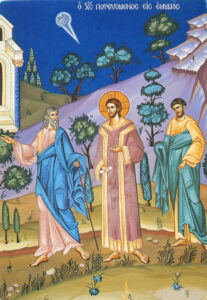
The stranger asked what they were talking about. They told Him: Are you the only one in Jerusalem who hasn’t heard what has happened? They repeated the story of the last few days, adding dejectedly, “But we had hoped He was the One to redeem Israel.” The man then opened the meaning of the Old Testament prophecies to them, explaining how it was necessary for the Messiah to suffer, die and enter into glory.
When He appeared to be going on (!), they invited Him to stay. At supper He took bread and blessed it. Suddenly “their eyes were opened, and they recognized Him, and He vanished out of their sight”.
Why had they not previously recognized this Man whom they knew well? The Risen Lord must have had some mysterious new property which allowed Him not to be recognized.
They ran into Jerusalem to tell the other disciples how He had been “known to us in the breaking of the bread” (a figure of the Holy Eucharist), only to be told that they already knew: “The Lord is risen. He has appeared to Simon Peter.”
Why are we not told what Jesus said to Peter? I’m guessing Peter didn’t want to talk about it. Only two days before, he had thrice denied that he even knew his Lord and Master – after promising, “Lord, I am ready to go with You, both to prison and to death.” Did Peter want to see His Risen Lord? I suspect the answer was Yes! and no… Even being forgiven can be humiliating.
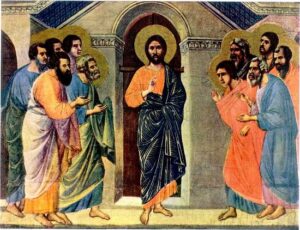
Suddenly, though the doors were shut, Jesus stood in their midst saying, “Peace to you” – “Shalom” in Hebrew, which means not just lack of turmoil, but fullness of life, all good things. This to the Apostles who would now have so little outward fullness of life. Most would lose their livelihood and their homeland and spend their lives “on the road” – expelled from Judaism, tortured, imprisoned. All except John would die as martyrs. But they would now have a different, deeper kind of inner peace. Saint Paul called it “the peace of God which passes all understanding.” Philippians 4:7
The disciples were terrified thinking they were seeing His ghost. (Such post-death appearances are not unknown.) Jesus said, “Why are you troubled? Why do you doubt? See my hands and my feet. Touch me.” Still, Luke says, they “disbelieved for joy”: It seemed too good to be true!
Jesus then asked, so casually, “What do you have here to eat?” and He ate some broiled fish and a honeycomb. Now they believed. Ghosts don’t eat. The Lord had truly risen. Christ had raised Lazarus and a couple of others, but now He had conquered death Himself. This was different.
Then He said: “This is what I told you while I was still with you…” (In what way was He, standing there with them, now not “with them”?) Again He explained the passages referring to Himself in the Law, the Prophets, the Psalms. This became the basis of the first Christian preaching. (Read the early chapters of the book of Acts.) “You are witnesses to these things… Behold I send the promise of my Father upon you. Remain in Jerusalem till you are given power from on high” – Pentecost, the coming of the Holy Spirit. Then suddenly He (including the food He had eaten!) was gone.
“There are more things in heaven and earth, Horatio, than are dreamt of in your philosophy.” Hamlet, Act 1
from Kiev Pechersk Lavra, recorded during bettr times
John’s account
He agrees that on Pascha night Jesus appeared to the disciples saying, “Peace be with you”. John adds that then He breathed on them * and said “Receive the Holy Spirit. As the Father has sent me, so I send you” – literally “I apostle you”.
- Breath, wind, spirit are one word in Hebrew (“ruach”), Greek (“pneuma”) and Latin (“spiritus”).
He added: “If you forgive the sins of any, they are forgiven. If you do not forgive the sins of any, they are not forgiven.”. This, by the way, is often-misunderstood: It does not mean that priests have power to forgive sins. “Only God can forgive sins.” Let’s talk about this some other time.
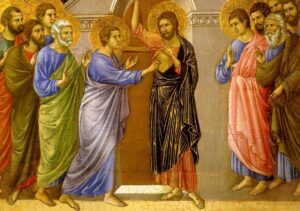
John adds that Thomas was absent on Pascha night and said he refused to believe unless he touched the Lord’s wounds for himself. The next Sunday night Thomas was with them when Jesus appeared: “Thomas, touch my hands and my side. Be no longer faithless but believing.” Thomas cried “My Lord and my God”.
He should be nicknamed not “Doubting Thomas” but “Believing Thomas”, for he was first to confess plainly the divinity of Christ. In one of our hymns we sing “Blessed is the unbelief of Thomas”. He is the Apostle to the skeptics, those who genuinely seek truth and are not easily convinced. (Personally, I consider that a virtue.)
This passage concludes with my least favorite line in the Bible: “Jesus did many more signs in the presence of his disciples which are not written in this book.” How I wish we knew them! I hope in heaven we will hear them.
Resurrection Appearances in Galilee
By the Sea of Galilee
Since the previous story seems to conclude John’s Gospel account, did he add this later in his old age? (“Oh, I almost forgot this one!”) – or perhaps it was added by someone who had heard it from John?
The disciples are back home, fishing at night in the Sea of Galilee, but had caught nothing. At dawn a Man on the shore calls out, “Children, have you any fish?” (They did not recognize His voice. Why not?) They answer, “No”. The man says “Cast the net on the other side and you will find some.” They did so and “were not able to draw the net in because of the number * of fish ”.
- John reports, oddly, that there were 153 fish, yet the net was not torn. Some say it was believed there were 153 nations in the world, and this signified their unbreakable Apostolic mission.
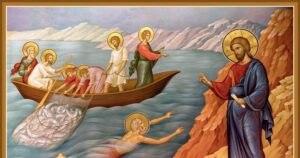
Peter cried “It is the Lord!” Remember how he had first met Jesus three years before? Luke 5 That time, too, they had caught nothing. Jesus had directed Peter to launch out and cast the nets and try again. Peter had thought that was crazy, but he did it, and there were so many fish they had to get an extra boat to haul them in.
Peter immediately understands: “It’s a new beginning! Jesus is giving me a second chance!” Impulsively he grabs his clothes, jumps into the water and swims to shore.
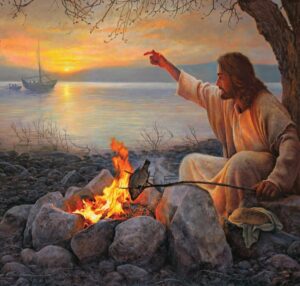
There on the shore, as the sun rose, the risen Lord and Master of all Creation had a fire going, and made a picnic for them. He said, “Come and have breakfast”. He took some bread and gave it to them (again a shadowing of the Eucharist) and also the fish. This part of the story concludes with the odd line, “None of them dared ask him, ‘Who are you?’, for they knew it was the Lord” – again suggesting there was something about Him that was different, not easy to recognize. What was it? Perhaps it couldn’t be put into words.
Simon Peter is forgiven.
After breakfast Jesus said to Simon Peter, “Simon son of Jonah, do you love me more than these?” Peter answered, “Yes, Lord, you know that I love you”. Jesus said “Feed my lambs”.
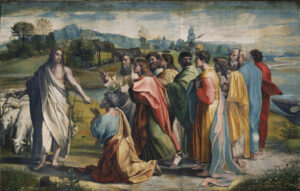
A second time: “Simon, son of Jonah, do you love me?” “Yes, Lord, you know that I love you.” “Tend my sheep.”
Peter could feel it coming for the third time. It must have cut like a knife. “Simon son of Jonah, do you love me?” “Lord you know everything”, he cried.”You know that I love you.” “Feed my sheep.”
You failed, Peter. Now you know how weak you are – something we all need to learn, brothers and sisters – and you are forgiven. Now get on with it. Lead my Church. Every time we hear this passage at Sunday Matins I get teary eyed.
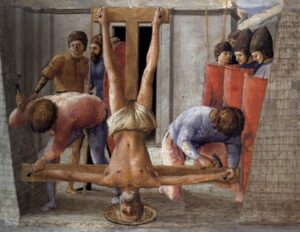
Jesus continued, speaking still to Peter: “When you were young you girded yourself and walked where you wished, but when you are old you will stretch out your hands, and another will gird you and take you where you do not want to go ” The text explains that the Lord said this to tell Peter by what death he would die. * Then Jesus said to him, “Follow me”.
- Thirty years later in Rome Peter would be crucified, his arms stretched out on a cross. Tradition says he asked to be crucified upside down, because he was not worthy to die as his Lord had.
Peter, as usual unable to restrain his tongue, pointed to John and asked, “Lord, what about this man?” [How will he die?] Jesus answered, “If I want him to remain till I return, what is that to you?” None of your business, Peter! “Follow me.”
On the mountain
Matthew’s Gospel concludes like this: Jesus had directed the women to tell the Apostles to go to Galilee, to the mountain where He would meet them. Matthew says there they met Him and “worshiped him, but some doubted”. We are not told who doubted.
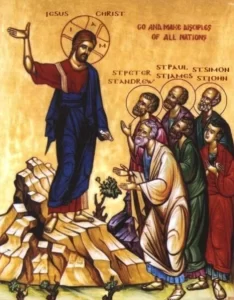
Jesus declared, “All authority in heaven and on earth has been given to Me”. (Can you imagine those words being taken seriously out of the mouth of anyone else who has ever lived?)
He then gave them what is sometimes called The Great Commission, similar to His Pascha night words in John: “Go and make disciples of all nations, baptizing them in the name of the Father and of the Son and of the Holy Spirit, teaching them to observe all I have commanded. And behold, I am with you always even to the end of the age.”
From Saint Paul:
This lesser-known account was probably the first written record of Christ’s Resurrection: “I told you that which I received [that is, from those who had been there, which Paul had not] that Christ was buried and rose again on the third day according to the Scriptures, and that He was seen by Cephas [Peter], then by the Twelve. After that he was seen by over 500 brethren at once, of whom most remain alive today.” [So you want to know if this was true? Go ask them!]
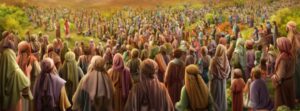
Is this the same appearance we just heard about in Matthew?
“After that He was seen by James [the only mention we have of Christ’s appearance to His step-brother, who would become first Bishop in Jerusalem], then by all the Apostles”, and last, Paul says, “by me” – his Damascus Road vision. I Corinthians 15
Saint Mark’s summary
There’s nothing new here, except he adds that Christ’s followers will “cast out demons; they will speak in new tongues; they will take up serpents, and if they drink any deadly thing it will not hurt them…” – which seem to be references to later events which have somehow crept in.
He concludes: The Apostles went out into all the world, “the Lord working with them” – as still He still does.
Saint Luke’s summary
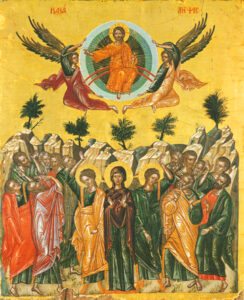
This is from the beginning of the book of Acts: “Jesus presented Himself alive after His suffering by many infallible proofs, being seen by them during forty days and speaking of the things regarding the kingdom of God. Then while they were in Jerusalem, He led them out towards Bethany [tradition says it was on the Mount of Olives], lifted up His hands and blessed them”. A cloud came over the mountain, “and He was parted from them and carried up into heaven”. Then two men in white stood beside them saying, “Why are you looking up into heaven? He will come again in the same way as you saw Him go into heaven”. And “they returned to Jerusalem praising and blessing God for all they had heard and seen”, and waited for the day of Pentecost and the coming of the Holy Spirit.
“I go to prepare a place for you” – that is what He said before His Crucifixion.
___________________
There has been more power in the Resurrection of Jesus Christ than in all the armies that have ever marched on earth.
“Good news”, that’s what the word “Gospel” means.
“Good news”, the best news possible. There is hope for the world. God has come to earth. Mankind have done their worst: they killed Him. And it didn’t work! He rose again. Christ our God Incarnate was victorious. The ultimate battle has been fought. What’s going on now is only the cleanup operation.
“Good news”, the best news possible.There is hope for us: Jesus Christ has delivered us from the fear of death. He has gone before us into the unknown that awaits all of us, into the darkness of death. And He is risen. So death for us is no longer darkness. When we die we meet Jesus Christ, who is on the other side of death, in the Light waiting for us. He has “trampled down death by death, and upon those in the tombs bestowing life”.
“Good news”, the best news possible. At the End will come the General Resurrection John 5:28-29 – our hope for new life in a renewed world: a new heaven, a new earth. Every year I wonder: Will I see another spring? Yes. Even if this is my last spring before I die, I will see another and even more beautiful spring. “For I know that my Redeemer lives, and He shall stand at last on the earth; and after my flesh is destroyed, this I know, That in my flesh I shall see God.” Job 19:25-26
“Good news”, the best news possible. This is what Christ’s Apostles proclaimed to all the world, beginning from Jerusalem, bringing peace and joy, and giving us power to arise, generation after generation, till the end of this age and unto ages of ages. For…
.Christ is risen! Truly he is risen!
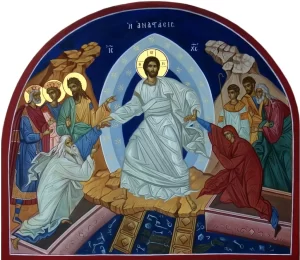
Next Week: Saint Nicholas in May?